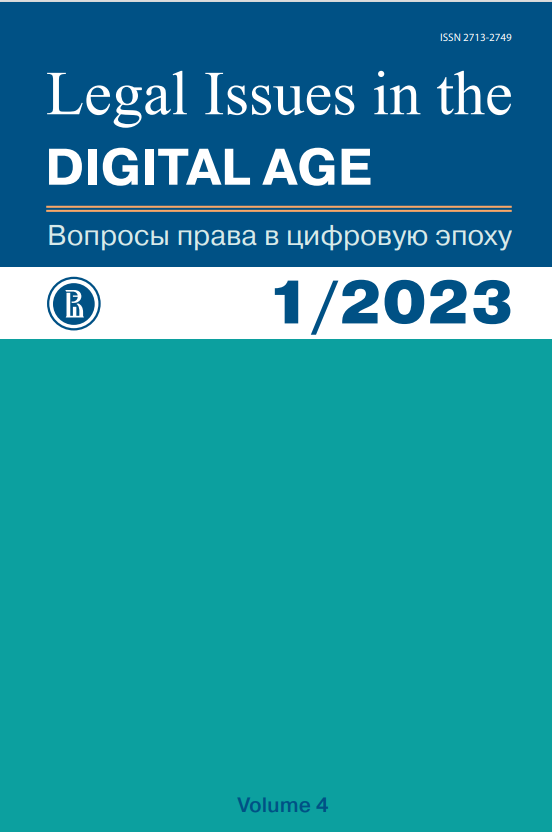New Concept of Employment: Development of Labor Relations in the Digital Age
Abstract
The role and underlying functionality of labor law are radically changing in the current geopolitical and economic context. Though it gives rise of relations that follow specific rules non-standard forms of employment like outstaffing, gig employment, self-employment, spot employment etc., they may escape any regulation. At the same time, the role of integrative associations at work, transnational corporations is changing. The digitization in labor law is reaching a principally new level. While new methods of business cooperation and social communications will trigger the emergence of new effective forms of employment, the applicable labor law does not adequately follow realities of the day nor takes into account new and various forms of engaging people in specific activities including work. In December of 2022 a meeting on the draft “On Employment” was held at the State Duma. The draft had chapters addressing relations involved in platform work, non-standard forms of employment, etc. However, the draft raised a discussion and was revised, with outstaffing to be regulated under new principles. However, while the draft is not made effective, it can be amended and specified to make the proposed subject even more relevant. Therefore a need to conceptualize new forms of employment and to further improve the relevant legislation is a major area of action today. Moreover, automation at work, while bringing positive developments such as the use of robots able of better performing identical and repetitive tasks, is also fraught with various risks. At that, the increasing use of artificial intelligence is another threat to employment of the population. It is only logical that digitization at work entails non-standard forms of using classical institutions, opening up new possibilities to use social partnership, particularly, in the activities of sectoral unions for regulation of collective labor relations as discussed below in the paper. Author looks at issue of remote work and the nature of approaches to regulation of the underlying relations from a perspective of qualitative changes to regulation of electronic communication between workers and employers as part of remote legal relationships. It is proposed to revise relevant areas of research of mentioned and other relations to address contemporary challenges emerging in the field of labor law in the digital age.
References
Andreeva L.Yu., Dzhemaev O.T. (2017) The influence of digital economy on the formation of new trends in the Russian labor market. Gosudarstvennoe e munitchepalnoe upravlenie=State and Municipal Management, no. 3, pp. 25–32 (in Russ.)
Belozerova K.I. (2022) Implications of digital technologies for the work function and related terms of employment contract. Actualnie problemy rossiiskogo prava=Issues of Russian Law, no. 7, pp. 91–98 (in Russ.) DOI: https://doi.org/10.17803/1994-1471.2022.140.7.091-098
Dzhioev S.H. (2006) The legal issues of promoting employment. Moscow: Prospect, 258 p. (in Russ.)
Eremin V.V. (2019) Robotization and employment: a deferred threat. Mir novoy economiki=World of Modern Economy, no. 1, pp. 25–35 (in Russ.) DOI: https://doi.org/10.26794/2220-6469-2019-13-1-25-35
Filipova I.A. (2020) Labor law: challenges of the information society. Pravo. Zhurnal Vysshey shkoly economiki=Law. Journal of Higher School of Economics, no. 2, pp. 162–182 (in Russ.) DOI: https://doi.org/10.17323/2072-8166.2020.2.162.182
Khubulova M.I. (2022) Artificial intelligence at work. Trudovoe pravo v Rossii i za rubezhom=Labor Law in Russia and abroad, no. 3, pp. 45–47 (in Russ.)
Kostoeva V. (2020) Better call Saul: will technologies be able to replace a lawyer? Available at: URL: https://www.forbes.ru/brandvoice/ipquorum/391127-luchshe-zvonite-solu-smogut-li-tehnologii-zamenitadvokata (accessed: 16.05.2021) (in Russ.)
Kotova S.I. (2019) The legal status of precarious workers in the labor market and the concept of employment. Candidate of Juridical Sciences Thesis. Moscow, 206 p. (in Russ.)
Labor Law of Russia (2005) S.P. Mavrin, M.V. Filippova, E.B. Khokhlov (eds.). Saint Petersburg: University, 448 p. (in Russ.)
Lyutov N.L. (2018) Telework: experience of the European Union and the problems of legal regulation in Russia. Russkiy Zakon=Lex Russica, no. 10, pp. 30–39 (in Russ.)
Motsnaya O.V. (2009) Atypical employment: theory and practice. Candidate of Juridical Sciences Thesis. Moscow, 207 p. (in Russ.)
Non-standard employment in Russian economy (2006) Gimpelson V.E., Kapelyushnikov R.I. (eds.). Moscow: Higher School of Economics, 92 p. (in Russ.)
Savenko L.I. (1986) Own-account work: concept and regulatory scope. Sovetskoye gosudarstvo i pravo=Soviet State and Law, no. 4, pp. 42–47 (in Russ.)
Sobchenko O.V. (2005) Legal issues of employment in Russia. Candidate of Juridical Sciences Summary. Moscow, 30 p. (in Russ.)
Stepanov V.O. (2013) Teleworkers as a new category in the Russian labor law. Trudovoe pravo=Labor Law, no. 6, pp. 9–12 (in Russ.)
Tishkovich K.S. (2021) Social dialogue in context of expansion of atypical forms of employment. In: For the rights of workers! Protection of social and labor rights in the changing world: opportunities and constraints. Conference proceedings. Ekaterinburg: University, 159 p. (in Russ.)
Authors who publish with this journal agree to the Licensing, Copyright, Open Access and Repository Policy.










